001: Starting at the Beginning
Featuring hundreds of oysters, bubbles of doubt, and the joy of noticing.
It's hard to summarise the first month working in a kitchen. Intense is too severe a word; fabulous sounds too frivolous. It's been hard work but good work.
I am conscious that I am still shiny and new. With my chef whites still gleaming and my labelled knife roll straight from cookery school, I was expecting a baptism of fire. Instead, I entered a kitchen full of people who were just as keen for me to learn as I was. I'm not so naïve as to believe this is purely altruistic. There is a shared understanding that I can contribute more to the kitchen as I learn and improve.
Initially, my days were spent wrapping my head around the kitchen layout and remembering where everything was. Nestled in the bottom of an old country house, the kitchen is split into four rough sections: Firsts (where I have been stationed), Seconds, Mains or Thirds, and Sweets. Each name corresponds to which course is prepared in that section.
I have a soft spot for Firsts. This little corner is protected from the heat of the stoves, positioned slightly off the central kitchen, with a big skylight above. It can sometimes feel like you are in a little world of your own. A private island where one can indulge in picking dainty wild garlic flowers and take the time to balance marigold petals onto a scoop of sorbet.
Most importantly, it is home to the kitchen's bookshelf. There are books from established chefs and restauranteurs and works by foodwriters and cooks, many of whom have no association with restaurants. I did my trial shift in Firsts. It was the first time I had ever stepped foot in a professional kitchen, but I felt comforted looking at books as familiar as my reflection. Nigella Lawson's 'Forever Summer' and the first volume of Nigel Slater's 'Kitchen Diaries' were an anchor; they still are. The displayed books also hinted at the kitchen's food ethos: good, seasonal produce prepared simply with immense care.
I attended a cookery school that rightfully prided itself on its holistic approach to cooking. It was never just about plating food beautifully or making something taste exquisite. Honouring all your senses was encouraged, and respecting the ingredients was mandatory. Every artichoke, gooseberry, or fig leaf was handled with reverence. I feel privileged to work in a kitchen where this ethos carries over.
The last lines of the poem Leisure by William Henry Davies float around my head:
"A poor life this if, full of care,
We have no time to stand and stare."
I think a lot about this. It feels quietly powerful to give yourself time to notice, to provide yourself with the space to stand and stare. Standing, shucking hundreds of oysters, you appreciate each shell's shades of blue, green, and even purple—the oyster glowing within, pearly white with a delicate black lace trim. I daydream of what I would pair them with. I think of Pernod with its aniseed headiness, of rhubarb with its brightness and subtle bitterness, of a smoky mezcal mignonette.
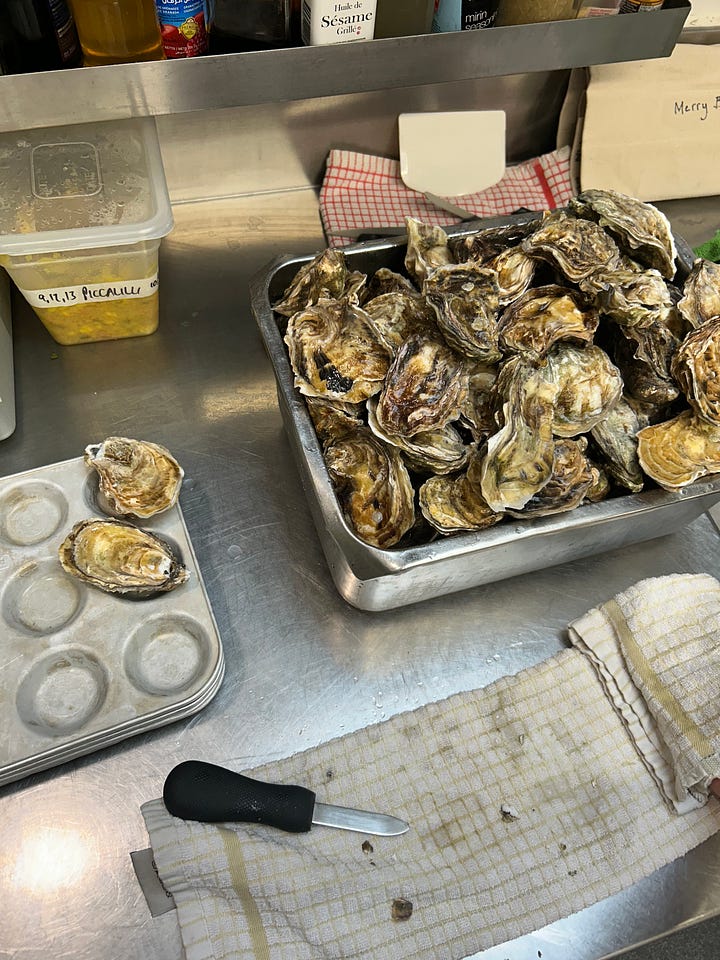
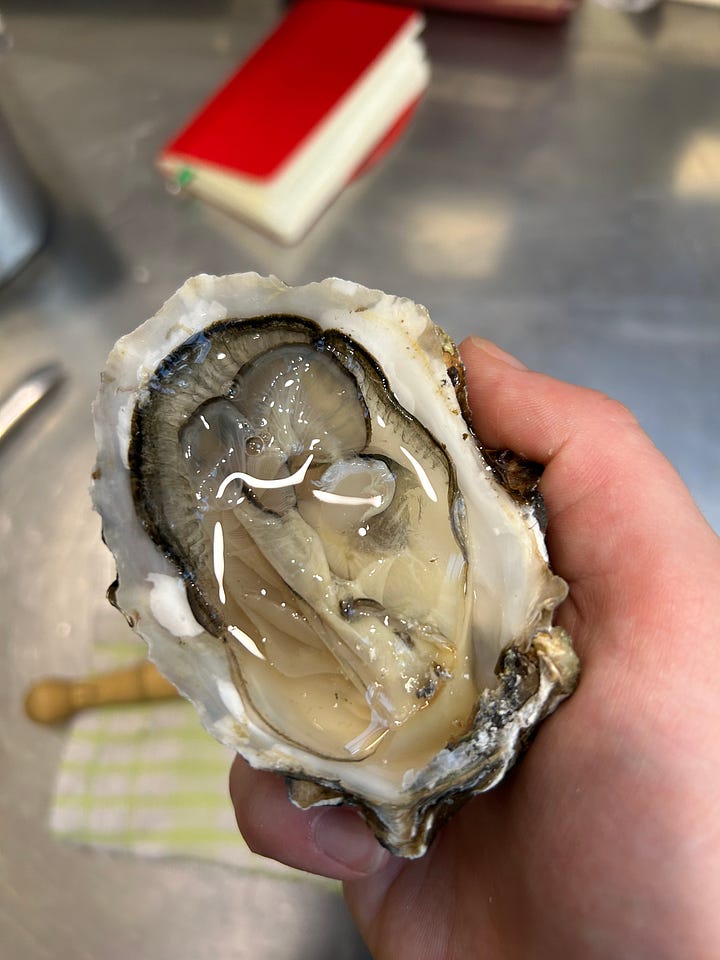
Some ingredients demand attention for their beauty, while others surprise you with their elegance. An example is a simple spoonful of vegetable stock infused with leftover pea pods.
The peas had only travelled ten minutes from their trellis to the kitchen. I tasted one when they arrived, still warm on my tongue for the spring sun. The stock tasted unlike anything I had ever had before. I took a spoon straight from the vast pot, gently simmering on the stove. It was a hot stock, yet somehow it was cool and refreshing. Its lightness confused me, and then I felt the involuntary grin split across my face. It tasted like spring. It had a depth of flavour afforded by the leeks, carrots, and other vegetables offset by the perfect sweetness of the pea pods. It was magic.
I haven't seen the stereotype of the hardened, bitter chef reflected in the kitchen where I work. Even so, I dread thinking that one day, I won't be amazed when a mayonnaise emulsifies before my eyes. I want to find a balance between the deftness of movement I admire in the chefs I look up to while keeping a tight grip on the wonder that brought me to where I am now.
I refuse to be indifferent to the magic of the kitchen.
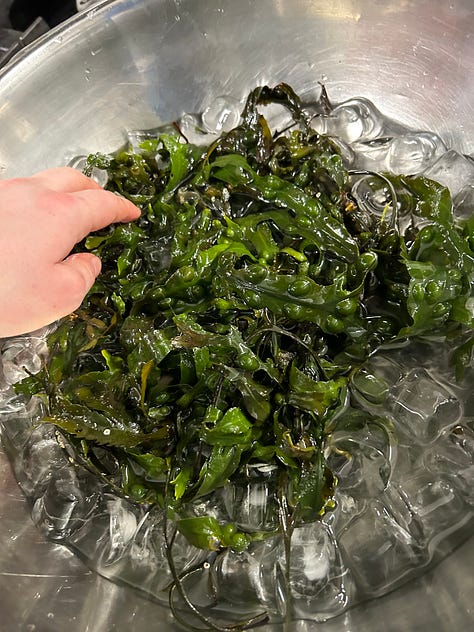
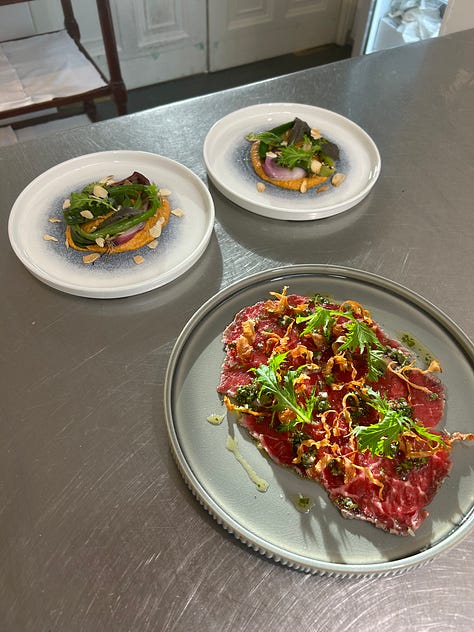
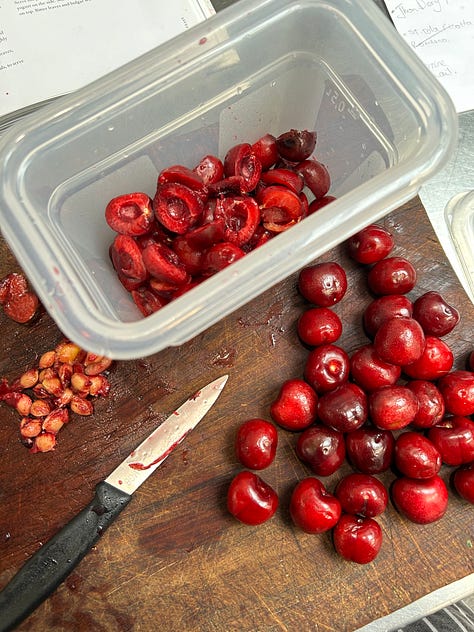
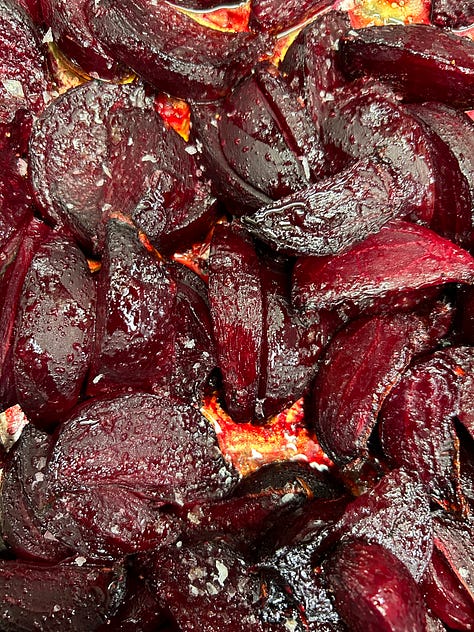
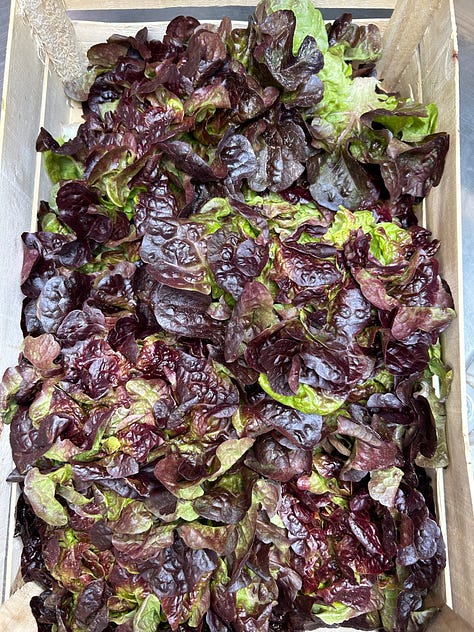
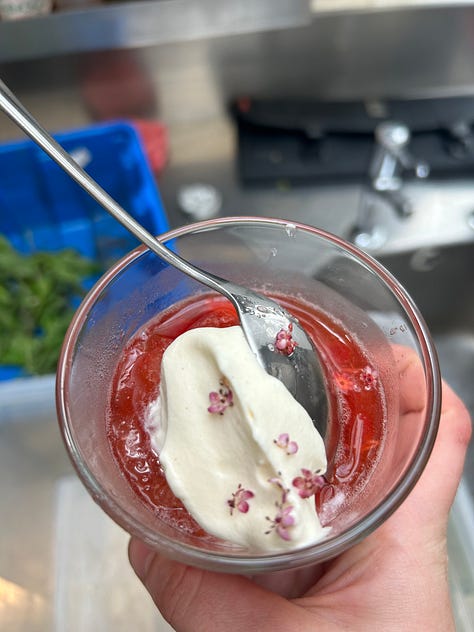
I am most envious of the speed. My movements certainly feel less clunky than they did at the beginning of this month, but I still yearn for the restrained elegance of the other chefs. I saw it, too, in cookery school. You could easily pick out those with restaurant experience. They moved with such ease. They were imbued with a confidence earned, not given.
My relationship with myself, particularly my physical body, has changed. I am hyper-conscious of my hands, my knees, my face. I am paranoid about cutting myself. The morning before my fifth shift, I sliced right down through my knuckle with a dull bread knife. I sat in my tiny kitchen at home, desperately keeping pressure on the cut and holding my hand above my heart as taught to encourage it to stop bleeding. All I could think of was how much it would slow me down. This lumpy bandage and the prickly, constant ache. I'm happy to report I haven't cut myself badly since; burns, on the other hand, abound.
There is a pleasant kind of tiredness that seeps into your bones. After my first few shifts, I would step out of my scalding hot shower and sit on the floor for half an hour, wrapped in my towel. It was like stepping off a boat after a long voyage. The stillness of solid ground throws off the body accustomed to the pitch and roll of the sea. To go from a kitchen filled with a symphony of pans sizzling, knives slicing, teaspoons jingling, oil spitting, fans whirring, pots bubbling... to the complete silence of my little flat was unnerving. I'd only read about or been told of the buzz of a kitchen. But to start to feel it for the first time is something else. You feel like you hold a frantic, kinetic energy at your fingertips.
I have written "Don't berate yourself for having to learn to walk before you can run" on a post-it note by my door. In my third week, one of the chefs I work with said the same thing to me, almost word for word. It felt like a weight lifted off my shoulders, one I didn't realise I was lugging around. It feels stupidly apparent, but I just needed someone to remind me that the people I was comparing myself to had been in kitchens for years. Some longer than I've been alive!
I started this newsletter to document what it is like to start working in a kitchen. One of the unexpected joys of writing is how quickly some things have changed, even in the time it's taken me to edit this newsletter! I had initially written the following:
"Try as I might, there is still the familiar bubble of panic that grows just below my sternum. If it arrives, it will be during the first two hours of a shift. It is oddly therapeutic to feel it sitting there. I appreciate its gentle weight and welcome it each day. Then, gently push it down and away."
Re-reading this is an odd experience! In the time it's taken to edit this newsletter, I haven't felt that bubble of doubt in a week or two. Progress!
Most of it comes down to trusting myself. The second-guessing is constant, but I feel myself slowly finding my feet, and I can't wait to see where it leads me.
Thank you for reading! If you enjoyed this Newsletter, please consider sharing it…
What I'm currently reading: I have just finished ‘Blood, Bones and Butter’ by Gabrielle Hamilton. A whirlwind of a read chronicling Hamilton’s relationship with food and the kitchens she has cooked in. From the spit-roasted lambs of her childhood in rural Pennsylvania, the back-breaking monotony of corporate catering, and the octopus she prepares for her mother-in-law in southern Italy, every description is mouth-wateringly vivid and specific. Startlingly honest, always thrilling, and beautifully written, it is a book I will be thinking about for weeks to come.
What I'm eating: I don’t often eat before my shift, although I will demolish a full cafetière of coffee, so cooking for myself becomes a day-off treat. I saw some gorgeous organic carrots and had to have them. I roasted them with honey, throwing in the tops at the last minute to get crispy. I whipped some Ardsallagh goats cheese with a little lemon and black pepper and slathered the plate with it. I piled up the carrots and the feathery tops, drizzling the whole plate in more honey and some peanut rayu. It was perfectly sweet, deeply umami and had a lightness from the goats cheese.
The sea says hello… I live ten minutes from the beautiful sea and go swimming at least four times a week. So, I wanted to share some of the beautiful pictures I have of the coast that bring me so much unbridled joy!
All my best wishes,
Merry x


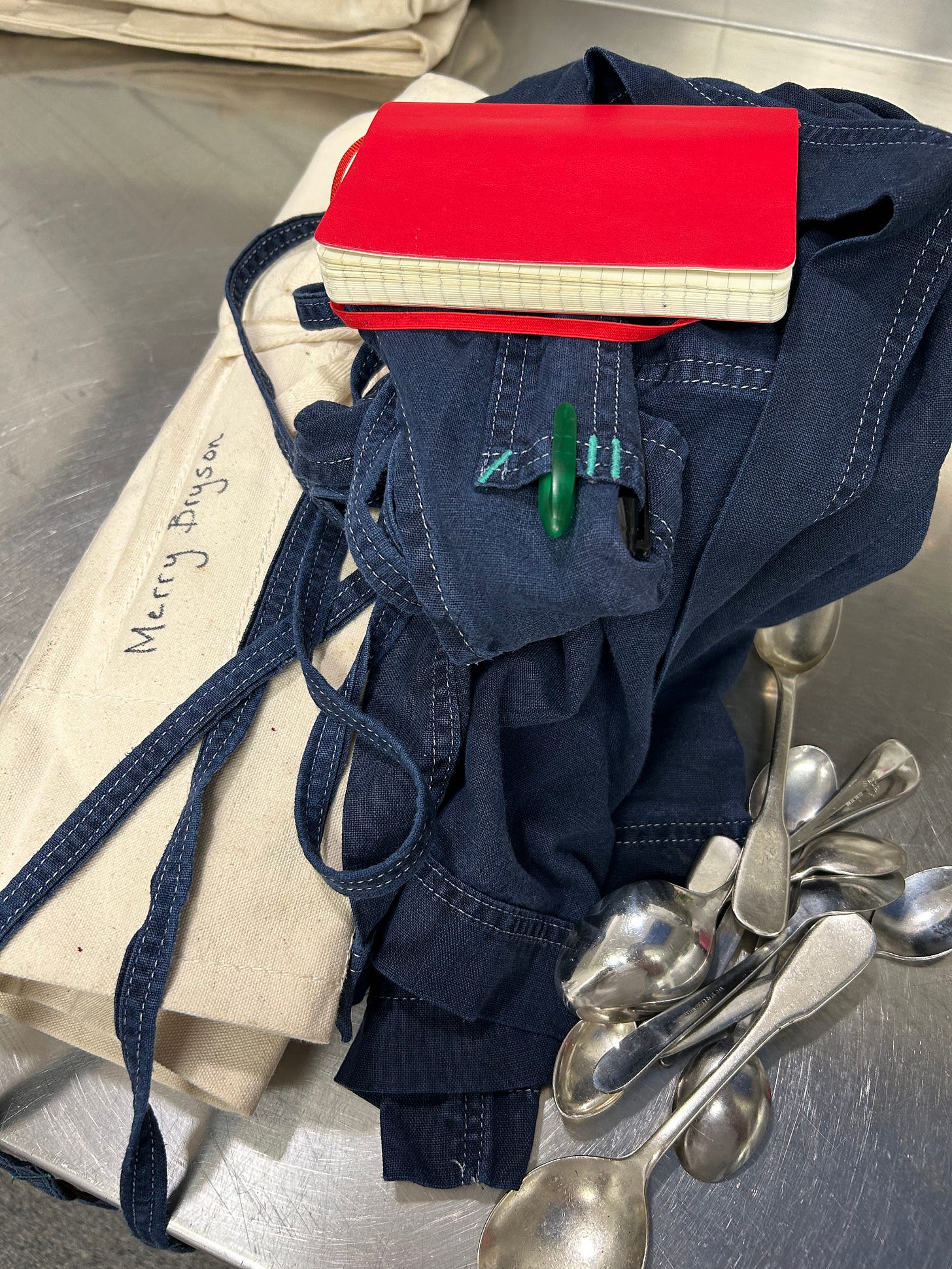
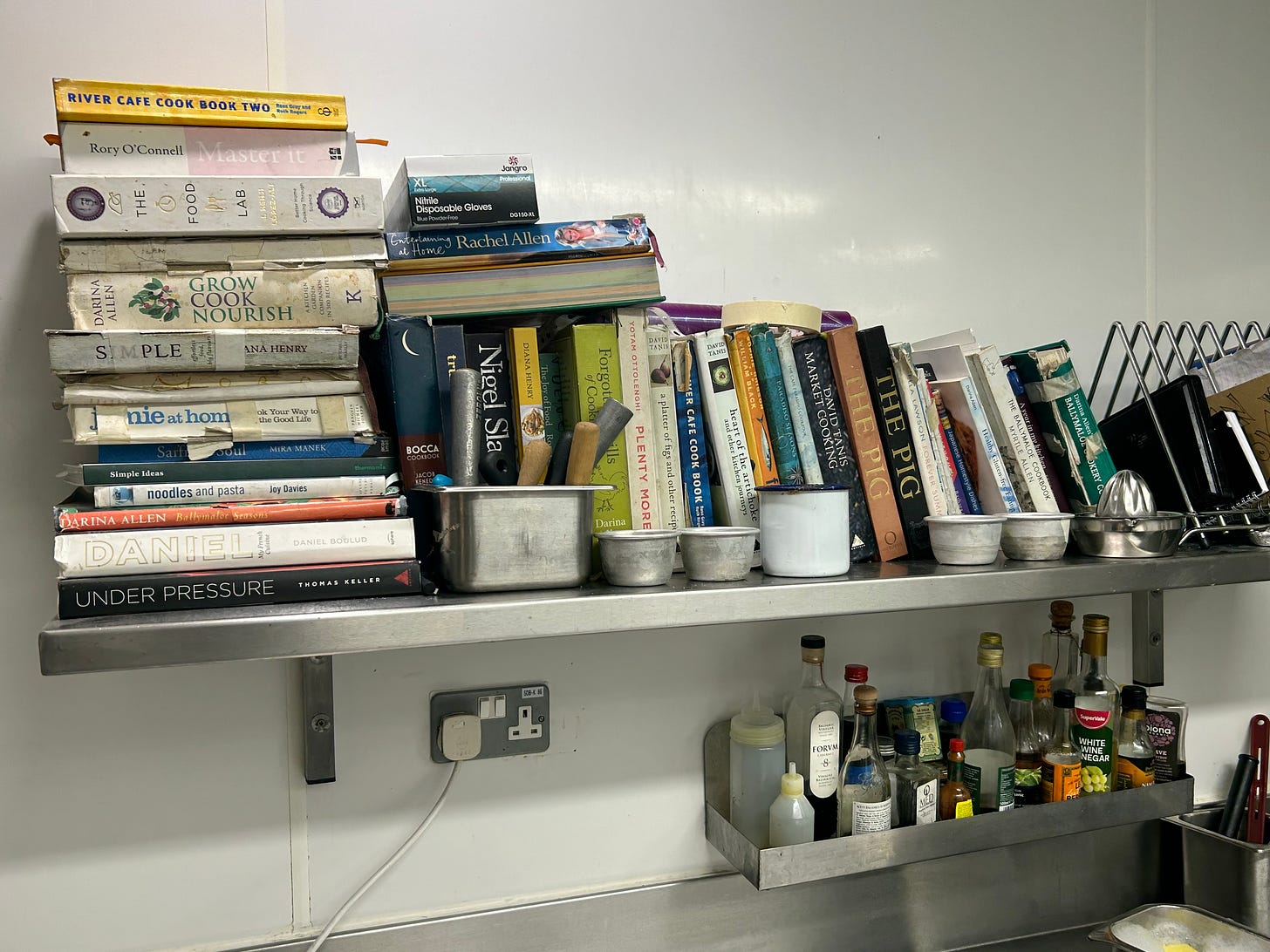

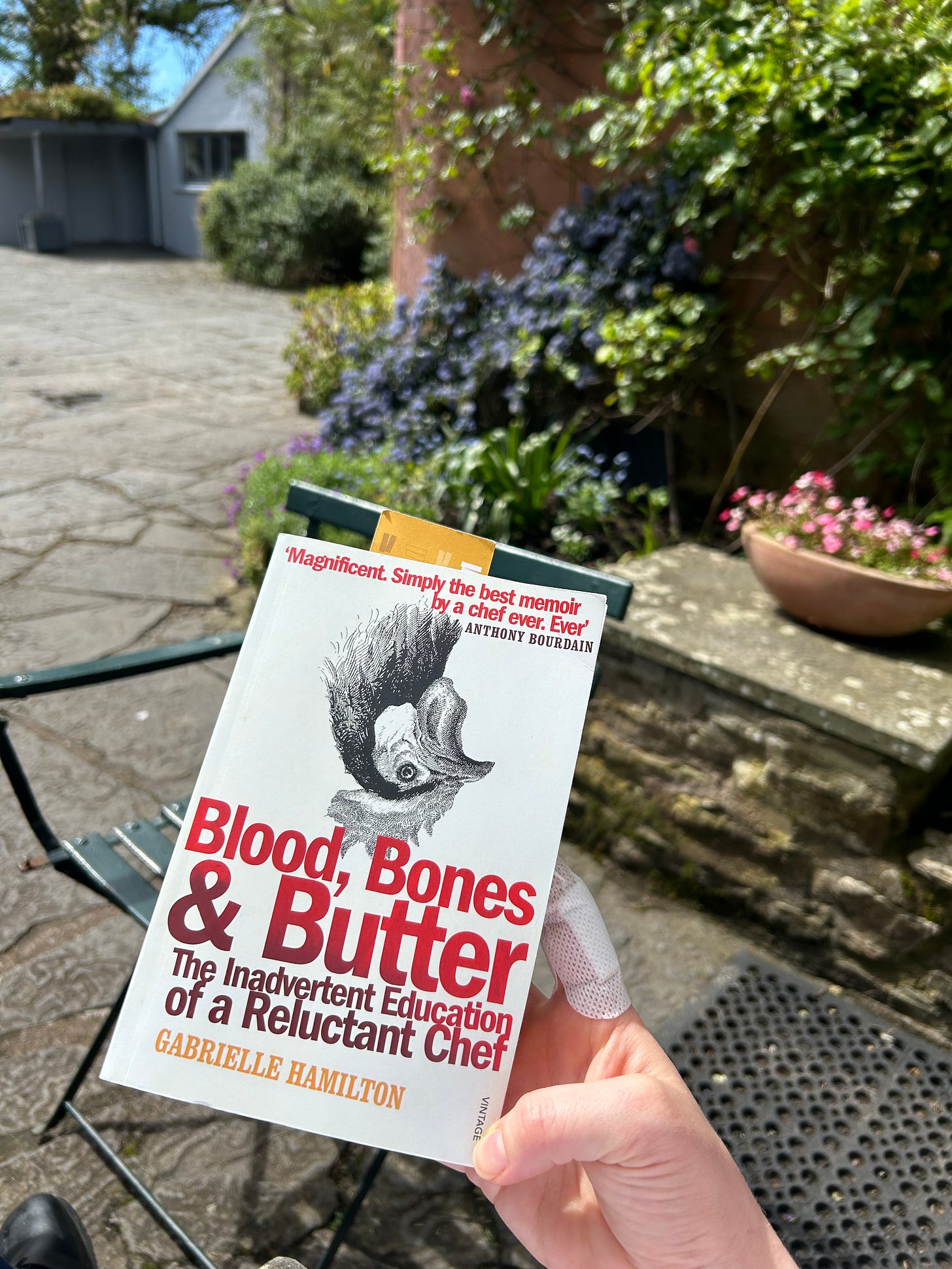


ooh ooh this is so wonderful i’m so glad i stumbled upon your substack! i’m also in my first kitchen job, similar to you and also strikingly different (i’m solo-cheffing the lunch menu in a coffee shop kitchen) - subbed and can’t wait to read more x
Love hearing about the kitchen life. Makes me wish there were some truth to the rumors of me joining you. Keep writing! Keep cooking! You’re brilliant!